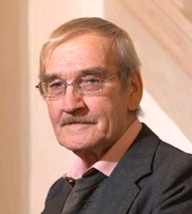Man who averted WW-III dies unnoticed in Russia
20 Sep 2017
 Stanislav Petrov, a former Soviet military officer known in the West as "the man who saved the world" for his role in averting a nuclear war at the height of the Cold War, has died at 77.
Stanislav Petrov, a former Soviet military officer known in the West as "the man who saved the world" for his role in averting a nuclear war at the height of the Cold War, has died at 77.
Petrov's friend, German film-maker Karl Schumacher, said on Tuesday that he died on 19 May. Schumacher called Petrov earlier this month to wish him a happy birthday, but was told by Petrov's son Dmitry that his father had died.
Schumacher announced the death online and it was eventually picked up by media outlets. The Russian state Zvezda TV station only reported the death on Tuesday.
Petrov was night duty officer at a Soviet early warning centre in the '80s outside Moscow on 26 September, 1983, when an alarm went off, signalling the launch of one and then another - in all 5 - US intercontinental ballistic missiles.
The 44-year-old lieutenant colonel had to quickly determine whether the attack was real. He chose to consider it a false alarm as the accompanying radar showed nothing, and did not report the alarm to his superiors.
Stanislav disobeyed military protocol and bravely declared the occurrence to be nothing but a false alarm. Stanislav was reprimanded by his superiors and this, perhaps, ended his promising career. Later he insisted that he had never wanted to start a war. The whole incident turned out to be nothing but a mysterious computer failure which has never been properly resolved.
His actions, which came to light years later, possibly prevented nuclear war. The incident occurred during one of the most harrowing periods of the Cold War, when the Soviet Union appeared to genuinely fear a surprise US nuclear attack.
Only a few weeks earlier, the Soviets shot down a passenger plane flying to South Korea from the US, suspecting it of spying, killing all 269 people aboard.
The United States, after a series of provocative military manoeuvres, was preparing for a major NATO exercise that simulated preparations for a nuclear attack.
In an interview with the BBC in 2013, Petrov told of how he had received computer readouts in the early hours of the morning of 26 September 1983 suggesting several US missiles had been launched.
"I had all the data [to suggest there was an ongoing missile attack]. If I had sent my report up the chain of command, nobody would have said a word against it," he said.
"All I had to do was to reach for the phone; to raise the direct line to our top commanders - but I couldn't move. I felt like I was sitting on a hot frying pan."
Although his training dictated he should contact the Soviet military immediately, Petrov instead called the duty officer at army headquarters and reported a system malfunction.
If he had been wrong, the first nuclear blasts would have happened minutes later.
"Twenty-three minutes later I realised that nothing had happened. If there had been a real strike, then I would already know about it. It was such a relief," he recalled.
A later investigation concluded that Soviet satellites had mistakenly identified sunlight reflecting on clouds as the engines of intercontinental ballistic missiles.
Quick thinking
In 2015, in an interview with The Associated Press, Petrov recalled the excruciating moments at the secret Serpukhov-15 control centre when the fate of the world was in his hands.
"I realised that I had to make some kind of decision, and I was only 50/50," Petrov said.
If he had judged it a real launch, the top Soviet military brass and the Kremlin would have had no time for extra analysis in the few minutes before incoming nuclear-tipped missiles hit Soviet territory. They would have likely ordered a retaliatory strike, triggering a nuclear war.
"It was this quiet situation and suddenly the roar of the siren breaks in and the command post lights up with the word 'LAUNCH,'" Petrov told the AP. "This hit my nerves. I was really taken aback. Holy cow!"
Within minutes of the first alarm, the siren sounded again, warning of a second US missile launch. Soon, the system was reporting that five missiles had been launched.
Petrov recalled standing up as the alarm siren blared and seeing that the others were all looking at him. Everyone was confused.
"My team was close to panic and it hit me that if panic sets in then it's all over," he said.
Petrov told his commander that the system was giving false information. He was not at all certain, but he was driven by the fact that Soviet ground radar could not confirm a launch. The radar system picked up incoming missiles only well after any launch, but he knew it to be more reliable than the satellites.
Reprimand, not reward
Petrov was not rewarded for his actions. In fact, he received a reprimand for failing to correctly fill the duty log and retired from the military the following year.
Although his commanding officer did not support Petrov at the time, he was the one who revealed the incident after the Soviet Union collapsed in 1991. If Colonel General Yury Votintsev had not spoken out, Petrov said he "would have forgotten about it like a bad dream".
After the story was told, Petrov received accolades, international awards and became known as "the man who saved the world."
But his role won him little fame in his homeland. He continued to live in a small, unkempt apartment in the Moscow suburb of Fryazino. There have been no official reports or statements about his death from any Russian government agency.
Schumacher said it was important for him to let the world know about Petrov's passing because "we owe this man a lot".


















